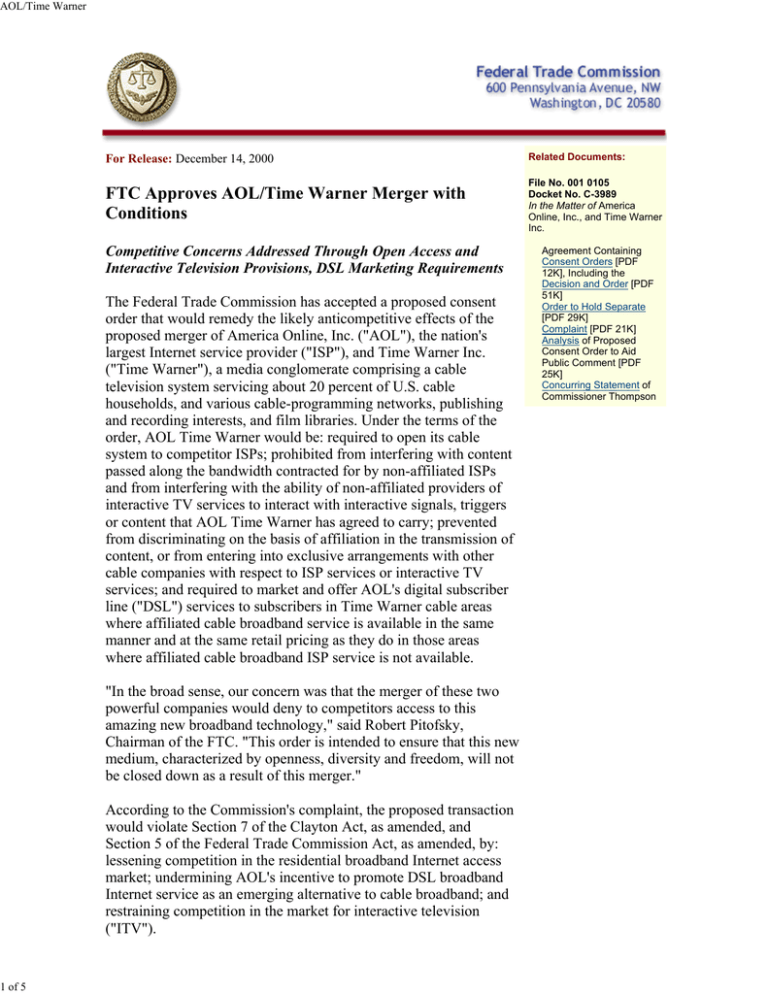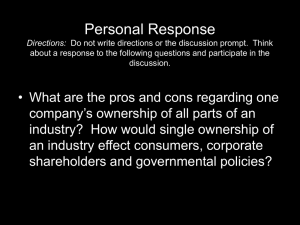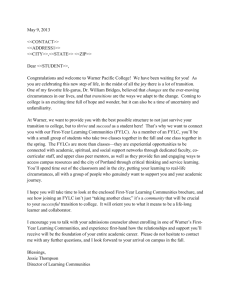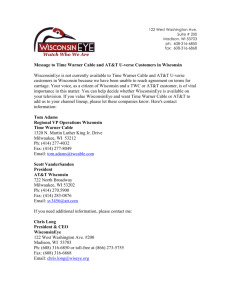Document 13617078
advertisement

AOL/Time Warner 1 of 5 For Release: December 14, 2000 Related Documents: FTC Approves AOL/Time Warner Merger with Conditions File No. 001 0105 Docket No. C-3989 In the Matter of America Online, Inc., and Time Warner Inc. Competitive Concerns Addressed Through Open Access and Interactive Television Provisions, DSL Marketing Requirements The Federal Trade Commission has accepted a proposed consent order that would remedy the likely anticompetitive effects of the proposed merger of America Online, Inc. ("AOL"), the nation's largest Internet service provider ("ISP"), and Time Warner Inc. ("Time Warner"), a media conglomerate comprising a cable television system servicing about 20 percent of U.S. cable households, and various cable-programming networks, publishing and recording interests, and film libraries. Under the terms of the order, AOL Time Warner would be: required to open its cable system to competitor ISPs; prohibited from interfering with content passed along the bandwidth contracted for by non-affiliated ISPs and from interfering with the ability of non-affiliated providers of interactive TV services to interact with interactive signals, triggers or content that AOL Time Warner has agreed to carry; prevented from discriminating on the basis of affiliation in the transmission of content, or from entering into exclusive arrangements with other cable companies with respect to ISP services or interactive TV services; and required to market and offer AOL's digital subscriber line ("DSL") services to subscribers in Time Warner cable areas where affiliated cable broadband service is available in the same manner and at the same retail pricing as they do in those areas where affiliated cable broadband ISP service is not available. "In the broad sense, our concern was that the merger of these two powerful companies would deny to competitors access to this amazing new broadband technology," said Robert Pitofsky, Chairman of the FTC. "This order is intended to ensure that this new medium, characterized by openness, diversity and freedom, will not be closed down as a result of this merger." According to the Commission's complaint, the proposed transaction would violate Section 7 of the Clayton Act, as amended, and Section 5 of the Federal Trade Commission Act, as amended, by: lessening competition in the residential broadband Internet access market; undermining AOL's incentive to promote DSL broadband Internet service as an emerging alternative to cable broadband; and restraining competition in the market for interactive television ("ITV"). Agreement Containing Consent Orders [PDF 12K], Including the Decision and Order [PDF 51K] Order to Hold Separate [PDF 29K] Complaint [PDF 21K] Analysis of Proposed Consent Order to Aid Public Comment [PDF 25K] Concurring Statement of Commissioner Thompson AOL/Time Warner 2 of 5 Under the proposed order, the Commission's antitrust concerns would be resolved by: (1) requiring AOL Time Warner to make available to subscribers at least one non-affiliated cable broadband ISP service on Time Warner's cable system before AOL itself began offering service, followed by two other non-affiliated ISPs within 90 days and a requirement to negotiate in good faith with others after that; (2) prohibiting AOL Time Warner from interfering with content passed along the bandwidth contracted for by non-affiliated ISPs, or discriminating on the basis of affiliation in the transmission of content that AOL Time Warner has contracted to deliver to subscribers over their cable system, including the transmission of interactive triggers or other content in conjunction with ITV services; and (3) requiring AOL Time Warner to market and offer AOL's DSL services to subscribers in Time Warner cable areas where affiliated cable broadband service is available in the same manner and at the same retail pricing as they do in those areas where affiliated cable broadband ISP service is not available. The proposed consent order would be effective for a term of five years. Access Provisions Before Time Warner can make AOL's broadband ISP service available in its largest cable divisions, the competing ISP service offered by the second largest ISP, Earthlink, must be made available to subscribers - i.e., ready for immediate use - in that cable division. The Earthlink agreement has been reviewed and approved by the Commission. In addition, AOL Time Warner cannot begin to advertise or promote AOL's broadband ISP service to subscribers in that cable division until either Earthlink's service is available to subscribers in that cable division, or Earthlink advertises or promotes its service in that cable division, whichever occurs earlier. This provision ensures that a competing ISP service is available to subscribers in the largest Time Warner cable areas before AOL introduces its cable broadband ISP service. In addition to the agreement with Earthlink, within 90 days after making AOL's broadband ISP service available to subscribers, Time Warner would be required to enter into agreements with at least two other non-affiliated ISPs to provide cable broadband ISP services in that Time Warner cable division. The non-affiliated ISPs and Time Warner's agreements with them must receive the prior approval of the Commission. If Time Warner fails to enter into such agreements within this time period, the Commission may appoint a trustee who will have the authority to enter into such agreements on Time Warner's behalf. Again, these agreements must receive the prior approval of the Commission. These agreements must be on terms comparable to either the Earthlink ISP service agreement approved by the Commission, or any agreement between AOL and another cable company to provide AOL's cable broadband ISP service over the cable company's cable system. In Time Warner's smaller cable divisions, Time Warner would be AOL/Time Warner 3 of 5 required to enter into agreements with at least three non-affiliated ISPs within 90 days after making AOL's broadband service available, subject to the prior approval of the Commission. If Time Warner fails to enter into such agreements within this timer period, the Commission may appoint a trustee who will have the authority to enter into such agreements on Time Warner's behalf on terms comparable to either any other agreement Time Warner has entered into with an ISP or any agreement AOL has entered into with a cable company. Time Warner would be required to include in all alternative cable broadband ISP service agreements submitted to the Commission for approval a "most favored nation" clause requiring that, if AOL executes a cable broadband ISP service agreement with another cable company, AOL Time Warner must provide the Monitor Trustee with a copy of the cable company agreement; give notice of the execution of the cable company agreement to each non-affiliated ISPs that is a party to an alternative cable broadband ISP service agreement approved by the Commission; and give the non-affiliated ISPs an opportunity to opt in to the same rates and terms secured by AOL in the cable company agreement. Throughout its cable holdings, the proposed consent order would require Time Warner to negotiate and enter into arms' length, commercial agreements with any other non-affiliated ISP that seeks to provide cable broadband ISP service on Time Warner's cable system. However, Time Warner may decline to enter into such negotiations or agreements, or impose rates, terms, or conditions, but only based on cable broadband capacity constraints, other cable broadband technical limitations, or cable broadband business considerations. It cannot refuse access on the grounds that adding another ISP would decrease or potentially decrease subscribers on AOL Time Warner's ISP. The purpose of these provisions is to ensure that a full range of content and services by non-affiliated ISPs is available to subscribers; prevent discrimination by AOL Time Warner as to non-affiliated ISPs on the basis of affiliation, which would interfere with the ability of the non-affiliated ISP to provide a full range of content and services; and remedy the lessening of competition in the market for broadband ISP service as alleged in the Commission's complaint. ITV and Other Internet Services The proposed consent order also addresses concerns about potential discriminatory treatment against non-affiliated ISPs in terms of the content and Internet services delivered to subscribers. Time Warner would be prohibited from interfering in any way with content passed along the bandwidth contracted for and being used by non-affiliated ISPs in compliance with their service agreements. The order also would prohibit Time Warner from discriminating on the basis of affiliation in the transmission or modification of content that Time AOL/Time Warner 4 of 5 Warner has contracted to deliver to subscribers over its cable systems. If requested by a non-affiliated ISP, Time Warner would be required to provide the non-affiliated ISPs with the same point of connection within Time Warner's cable divisions that Time Warner provides to affiliated ISPs. This provision is intended to ensure that Time Warner does not discriminate against non-affiliated ISPs by providing them with a less-advantageous point of connection to its network than it provides to AOL. Time Warner may not interfere with the ability of a subscriber to use, in conjunction with ITV services provided by a person not affiliated with AOL Time Warner, interactive signals, triggers, or other content that AOL Time Warner has agreed to carry. This means that if, for example, Time Warner has agreed to transmit ITV signals or interactive triggers that AOL subscribers can use, it cannot block transmission of such ITV signals or triggers to subscribers using a competing ITV service. Second, AOL Time Warner would be prohibited from entering into any agreement with any cable company that would interfere with the ability of such cable company to enter into agreements with any other ISP or provider of ITV services. The proposed order also requires AOL Time Warner to provide the Commission with notice of complaints it receives regarding its failure to provide content to broadband ISPs, or its failure to carry a television programmer's interactive signals, triggers, or content. DSL The proposed order would also require AOL to charge the same or a comparable price for its DSL service to subscribers in Time Warner cable areas where AOL cable broadband ISP service or RoadRunner is available as AOL charges for its DSL service in areas in which neither AOL cable broadband ISP service nor RoadRunner is available. However, AOL would be permitted to charge different prices for its DSL service to the extent such pricing differences reflect any actual differences in the costs of DSL transmission services, in which case AOL Time Warner would have to include a description of these cost differences in the reports they are required to submit to the Commission. Likewise, AOL would be required to market and promote its DSL services to subscribers in Time Warner cable areas where AOL cable broadband ISP service or RoadRunner is available at the same or comparable level and manner as AOL markets and promotes DSL services to subscribers in areas in which neither AOL cable broadband ISP service nor RoadRunner is available. A summary of the consent agreement will be published in the Federal Register shortly. The agreement will be subject to public comment for 30 days, until January 16, 2001, after which the AOL/Time Warner 5 of 5 Commission will decide whether to make it final. Comments should be sent to the Federal Trade Commission, Office of the Secretary, 600 Pennsylvania Avenue, N.W., Washington, D.C. 20580. The Commission vote to accept the proposed consent order was 5-0. Commissioner Mozelle W. Thompson issued a statement concurring with the order. NOTE: A consent agreement is for settlement purposes only and does not constitute an admission of law violation. When the Commission issues a consent order on a final basis, it carries the force of law with respect to future actions. Each violation of such an order may result in a civil penalty of $11,000. Copies of the complaint, the proposed consent agreement, an analysis of the agreement to aid public comment and the separate statement by Commissioner Thompson, are available at the FTC's web site at http://www.ftc.gov/ and also from the FTC's Consumer Response Center, Room 130, 600 Pennsylvania Avenue, N.W., Washington, D.C. 20580; 877-FTC-HELP (877-382-4357); TDD for the hearing impaired 1-866-653-4261. To find out the latest news as it is announced, call the FTC News Phone recording at 202-326-2710. Media Contact: Eric London Office of Public Affairs 202-326-2180 Staff Contact: Richard G. Parker Bureau of Competition 202-326-2553 (FTC Matter No. 0010105) (http://www.ftc.gov/opa/2000/12/aol.htm)





